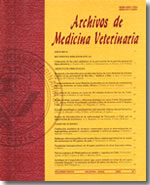A gonadotropin releasing hormone analogue decreases follicle stimulating hormone (FSH) secretion in prepubertal female sheep
Main Article Content
Abstract
LH and FSH secretions depend on the pulsatile secretion of GnRH from the hypothalamus. However, the grade of dependency as well as the relationship between pulses of GnRH and pulses of FSH secretion is less clear. Experiments in monkeys have shown that high GnRH pulse frequency favors LH secretion while low frequency of GnRH pulses preferentially stimulates the FSH secretion. The objective of the present work was to recognize the dependence of GnRH on the FSH secretion in prepubertal female sheep. A GnRH agonist analogue in slow release microcapsule preparation was used (Trp6-GnRH, (Decapeptyl®)) whose blocking effect on the LH release has been previously demonstrated. The analogue was injected intramuscularly every 4 weeks beginning at 20 weeks of age three times in five Suffolk ewe lambs. Another group of five lambs received the vehicle of Decapeptyl. Studies of FSH pulsatility were carried out at 20 (before the analogue agonist administration), 26 and 30 weeks of age. The CLUSTER program was used to identify characteristics of FSH secretion: transversal mean (ng/ml/5h), frequency of pulses (number of pulses/5h), amplitude of pulses (ng/ml) and nadir (ng/ml) . In the control group, FSH secretion characteristics did not change between 20 and 30 weeks of age. In the experimental group, mean FSH concentrations decreased from 3.4±0.3 ng/ml/5h at 20 weeks of age to 0.36 ±0.1 ng/mL/ 5h at 30 weeks of age (P<0,05), which was also significantly lower than in the control group of the same age. Amplitude of FSH pulses in lambs of 30 weeks of age were significantly lower than in lambs of 20 weeks of age (4.4 ± 0.5 versus 0.5 ± 0.1 ng/mL respectively, P<0.05), and lower than that exhibited by control ewe lambs of 30 weeks of age. FSH pulse frequency did not change between lambs of 20 and 30 weeks of age in either group. Results show that the GnRH analogue is able to block the FSH secretion suggesting that the FSH secretion is dependant on GnRH stimulation in prepubertal female sheep.

